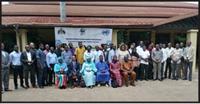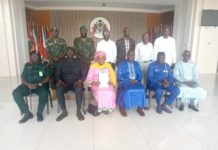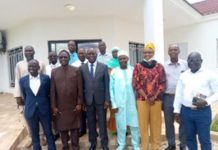The Ministry of Petroleum and Energy (MOPE) on Wednesday validated the Renewable Energy (RE) Entrepreneurship Training Modules for Secondary, Vocational and Higher Education in The Gambia.
The project focuses on the development of strategy and regulation on the integration of small to medium scale renewable energy systems, demonstrating technical feasibility and promoting investments, renewable energy projects, entrepreneurship skills, development and monitoring and evaluation.
Kaddijatou Diallo, the project coordinator of United Nations Industrial Development Organisation (UNIDO), explained that the validation presents a milestone for The Gambia’s education sector in order to increase knowledge on renewable technologies and the understanding of the business models applicable to small-to-medium scale RE projects.
“A curriculum has been developed for young entrepreneurs to enhance their understanding of the subject matter. Young women and men, through the curriculum would learn about the technical principles guiding the operation of RE technologies.”
She, however, reiterated that the students will learn how to design, manufacture, install, operate and maintain solar, biomass and wind technologies.
Ms. Diallo added that the students having completed the training would be impacted the skills to be self-employed through starting up their own RE business or gain employment in relevant establishments.
“The curriculum, training modules and materials that have been developed will be used in facilitating training and train the trainers in The Gambia, to build the sustainable and green future. The project, through its approach of ensuring that both women and men benefit from the skills development activities, would lead to women contributing actively in the RE sector early on and may guide other countries in the ECOWAS region on how to mainstream gender in the energy sector.”
Lamin Camara, permanent secretary at MOPE, stated that The Gambia would for the first time not only develop the first RE entrepreneurship curriculum but would also design suitable training modules for the different educational levels in the country, ranging from secondary school to higher education.
“MOPE in collaboration with UNIDO is implementing a Global Environment Facility (GEF) funded project called; Greening the productive sectors in The Gambia: promoting the use and integration of small to medium scale renewable energy systems in the productive sectors. The key component of the project involves the development of RE curriculum and training modules for secondary, tertiary and Higher Education.”
He added that the objective is the development of a comprehensive, user friendly and a well domesticated RE entrepreneurship curriculum with relevant training materials.
Anthony Mendy, representative of the Ministry of Higher Education, Research, Science and Technology said that the development of skills is paramount most especially in RE.
“We need to enhance the skills of the young ones so that they can compete in the market. We need to have a standardised programme.”
He added that they are working to transform the GTTI into a University.






